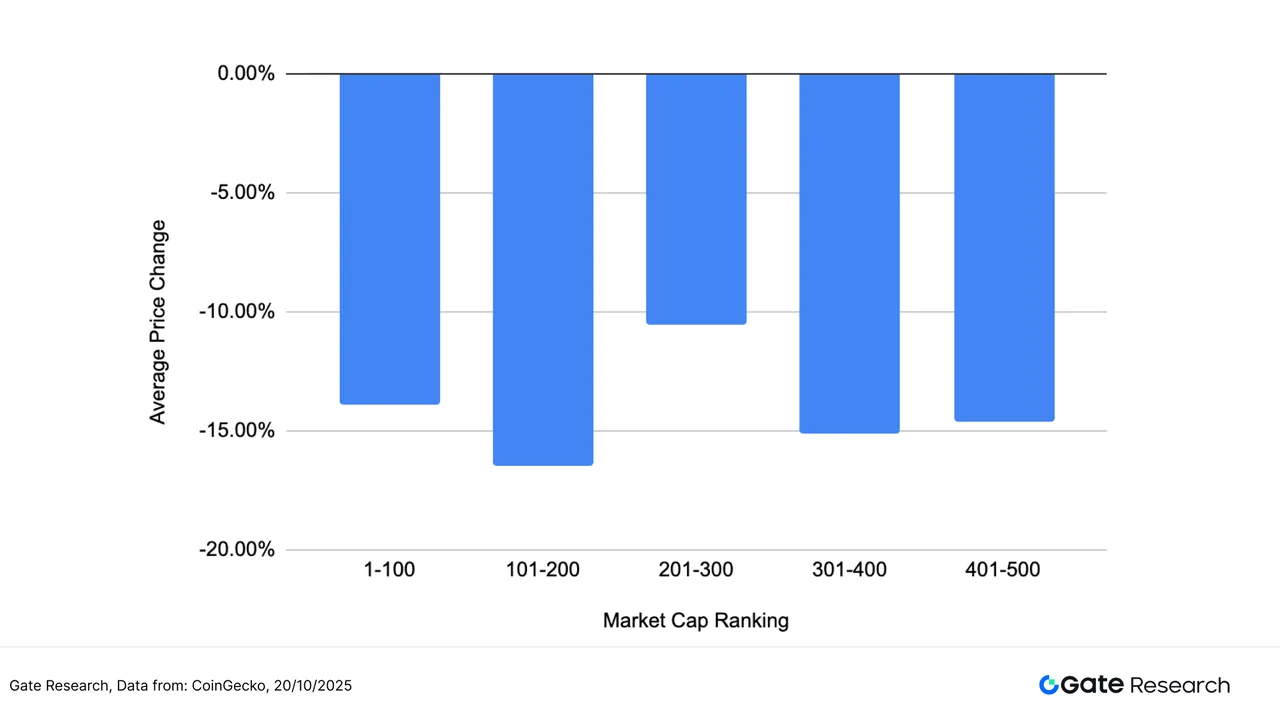When Tesla's earnings report dragged Bitcoin down, and MicroStrategy became a Bitcoin pointer, we suddenly realized that the funding channels between tech stocks and the crypto market have quietly opened up.
In the recently concluded earnings report week, traditional tech giants and the crypto market exhibited unprecedented interconnectedness. The performance of tech stocks no longer only affects the Nasdaq index but also directly influences the nerves of cryptocurrencies like Bitcoin.

1. The Amazing Synchronization Between Tech Stocks and the Crypto Market
● In late October, a cross-market linkage quietly unfolded. Tech giant Tesla's stock price suffered due to capital expenditure plans exceeding expectations, and a few hours later, Bitcoin also plummeted significantly. This synchronization is not coincidental; as traditional investment institutions allocate both tech stocks and crypto assets, a rapid emotional transmission mechanism is being established between the two markets.
● The U.S. stock market index set new closing highs consecutively at the end of October, driven by hopes of breakthroughs in U.S.-China trade negotiations. This rebound in risk appetite historically favors risk assets, providing support for cryptocurrencies.
● The correlation between tech stocks and crypto assets significantly increased in 2025. According to professional analysis, the correlation coefficient between Bitcoin and the Nasdaq index has recently reached about 0.7, highlighting the close relationship between the two. This data means that when tech stocks rise or fall, Bitcoin has about a 70% probability of moving in the same direction.
Correlation Indicators
Data/Phenomenon
Market Significance
BTC and Nasdaq Correlation Coefficient
About 0.7
Highly positively correlated
Seven Major Tech Stocks Rise Across the Board
Typically boosts risk appetite in the crypto market
Funds may flow in simultaneously
Poor Earnings Reports from Tech Stocks
Often trigger synchronized declines in BTC
Risk appetite declines simultaneously
This correlation is particularly evident when the performance of large tech stocks diverges. In the first five months of 2025, Microsoft rose 9.2%, Meta surged 10.6%, while Apple fell 19.8% and Tesla dropped 14.2%. This divergence directly affects investors' risk appetite, thereby influencing the flow of funds between traditional tech stocks and crypto assets.
2. The Business Transformation Behind Coinbase's Earnings Report
● Coinbase delivered an impressive performance in the third quarter of 2025, showcasing the resilience of the crypto exchange amid market volatility. The company achieved a net profit of $433 million, with earnings per share of $1.50, a significant increase from $75.5 million in the same period last year.
● This performance was primarily driven by increased trading volume due to heightened volatility in the digital asset market. Although weak economic data in August triggered market sell-offs, overall volatility still prompted investors to increase hedging operations, thereby enhancing the exchange's business performance.
A close analysis of Coinbase's revenue structure reveals its ongoing profound transformation:
Financial Indicators
Q3 2025 Data
Year-on-Year/Quarter-on-Quarter Change
Business Significance
Total Revenue
$1.87 billion
Exceeding market expectations of $1.8 billion
Overall business expansion
Trading Revenue
$1.05 billion
Significantly up from $573 million in the same period last year
Core business remains strong
Subscription and Service Revenue
$747 million
Up 14%
Revenue diversification showing results
Trading Volume
$295 billion
Below market expectations of $310.2 billion
Market share facing competition
Adjusted Earnings Per Share
$1.44
Estimated at $1.21
Profitability exceeds expectations
Source: Coinbase Earnings Report
● Coinbase CEO Brian Armstrong stated in a letter to shareholders: “The third quarter was a strong one for Coinbase. We drove solid financial performance, maintained our focus on launching innovative products, and continued to build the foundation of the ‘everything exchange’.”
● More importantly, Coinbase's revenue sources are diversifying. Subscription and service revenue increased by 14% to $747 million, indicating the company's shift from relying solely on trading fees to a more stable revenue model. At the same time, total operating expenses decreased by $134 million, a 9% quarter-on-quarter reduction, reflecting improved operational efficiency.
3. MicroStrategy's Bold Bet on Bitcoin
● MicroStrategy (stock code: MSTR) has deeply tied its fate to Bitcoin. The company's third-quarter earnings report showed a staggering net profit of $2.8 billion, a remarkable turnaround from a loss of $340.2 million in the same period last year. This performance was almost entirely due to unrealized gains from its Bitcoin holdings.
● The company's diluted earnings per share (EPS) reached $8.42, exceeding Wall Street's expectations of $8.15. Total revenue was $128.7 million, a 10.9% year-on-year increase, also surpassing analysts' forecast of $116.35 million.
MicroStrategy's Bitcoin strategy has become extremely aggressive:
Bitcoin Holding Indicators
As of October 30, 2025 Data
Market Significance
Total Holdings
640,808 BTC
Largest Bitcoin holdings among publicly traded companies
Total Cost
$4.744 billion
Total investment scale
Average Purchase Price
$74,032/BTC
Holding cost line
Current Holding Value
$70.9 billion (at current price)
Floating profit scale
Year-to-Date Bitcoin Return
26%
Investment performance
Source: MicroStrategy Earnings Report
● Company founder Michael Saylor has been unabashedly optimistic about Bitcoin in recent public appearances: “By the time bankers tell you this is a good idea, the cost of each Bitcoin will reach $10 million.” He added that Bitcoin is currently in a “99% discount” phase.
Saylor's price prediction for Bitcoin is extremely optimistic; he expects Bitcoin to reach $150,000 by the end of 2025 and rise to $1 million within the next four to eight years.
● MicroStrategy's business model has completely transformed. The company raises funds through issuing various preferred stocks—Strike (STRK), Strife (STRF), STRD (Stride), and STRC (Stretch)—to continue purchasing more Bitcoin. S&P Global recently assigned MicroStrategy a “B-” issuer credit rating, affirming the company's capital management strategy.
4. Three Linkage Channels Between Tech Stocks and the Crypto Market
Three clear linkage channels have formed between tech stocks and the crypto market:
● Integration of Investor Structure and Funding Pools. The same investors trade both tech stocks and cryptocurrencies simultaneously. When the tech stock portion of a portfolio suffers losses, investment managers will simultaneously reduce crypto positions to control overall risk exposure. Hedge funds and large asset management companies now commonly include these two asset classes within a unified risk management framework.
● Shared Label of “High-Risk Growth Assets.” In the current macro narrative, unprofitable tech stocks and cryptocurrencies are categorized together: both are highly sensitive to interest rates, rely on future growth expectations, and attract specific categories of risk capital. When the Federal Reserve sends hawkish signals, indicating a pause in further rate cuts, both asset classes come under pressure simultaneously.
● Company-Level Asset Allocation Directly Connects Markets. MicroStrategy holds over 640,000 Bitcoins, and tech companies like Tesla also allocate Bitcoin on their balance sheets. These company-level decisions link the performance of traditional tech companies directly to Bitcoin prices, forming a substantial basis for interconnection.
Linkage Mechanism
Operational Method
Typical Cases
Capital Flow Linkage
Tech stocks decline → Margin calls → Sell BTC
Tech stock earnings report disaster triggers BTC decline
Emotional Contagion
Risk appetite changes simultaneously
Nasdaq hitting new highs drives BTC breakout
Asset Allocation Linkage
Corporate balance sheets hold simultaneously
MicroStrategy holds 640,000 BTC
5. Opportunities and Risks in the Linkage
● In the short term, the linkage between tech stocks and the crypto market may continue. Federal Reserve policy remains the key link connecting these two markets. Any signals regarding maintaining high interest rates or delaying rate cuts could simultaneously impact both tech stocks and crypto assets.
J.P. Morgan analyst Nikolaos Panigirtzoglou believes: “In an environment of high macro uncertainty, the correlation of risk assets tends to rise, and investors are inclined to view them as a whole for position management.” This consistency is particularly evident during earnings report seasons.
● However, in the medium to long term, the cryptocurrency market may gradually emerge from an independent trend. Bitcoin has its unique supply and demand dynamics—halving cycles, institutional adoption progress, and geopolitical factors may drive it to decouple from tech stocks. Historical data shows that the correlation between Bitcoin and the Nasdaq is not stable, having dropped below 0.3 at one point in early 2023.
For investors, this new market relationship presents both challenges and opportunities. The challenge lies in risk contagion. Traditional stock-bond allocation theories have not fully considered the linkage effects between tech stocks and the crypto market. A purely tech stock investment portfolio is, in fact, indirectly exposed to risks in the crypto market.
Join our community to discuss and grow stronger together!
Official Telegram community: https://t.me/aicoincn
AiCoin Chinese Twitter: https://x.com/AiCoinzh
OKX benefits group: https://aicoin.com/link/chat?cid=l61eM4owQ
Binance benefits group: https://aicoin.com/link/chat?cid=ynr7d1P6Z
免责声明:本文章仅代表作者个人观点,不代表本平台的立场和观点。本文章仅供信息分享,不构成对任何人的任何投资建议。用户与作者之间的任何争议,与本平台无关。如网页中刊载的文章或图片涉及侵权,请提供相关的权利证明和身份证明发送邮件到support@aicoin.com,本平台相关工作人员将会进行核查。



